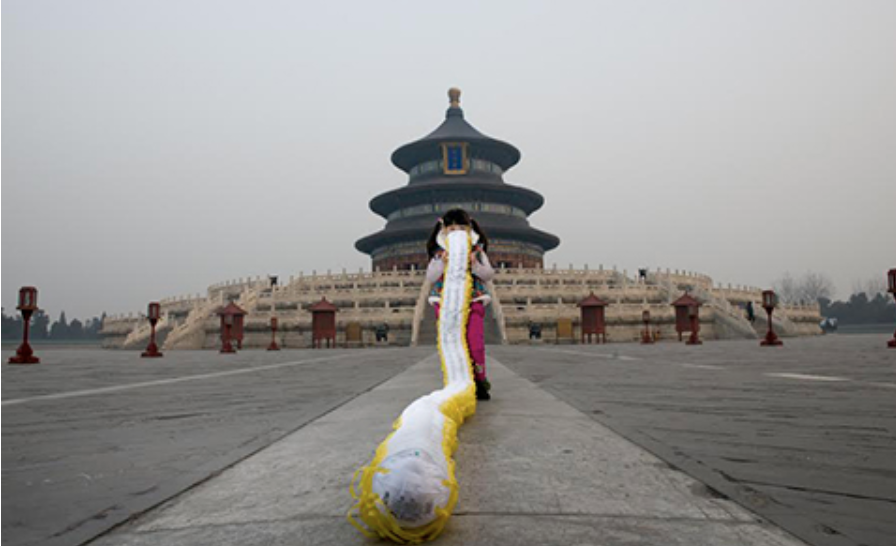This article examines how artists have engaged with the issue of air pollution in Beijing, where poor air quality has become a serious public health matter. Artists have utilized various mediums including performance art, photography, and painting to represent smog. Through generating media and online attention this work has contributed to a relatively vibrant “green public sphere” (Yang and Calhoun, 2007) of air pollution discourse. In contrast to much resistance in China that relies upon making specific claims to government officials, artistic expression bypasses the authorities and appeals instead to public opinion. Artists utilize ambiguity to portray air pollution in novel ways that subtly question the structures that produce and sustain it. In this way, artists can challenge popular perceptions of smog and raise public awareness, thus intensifying support for policies that tackle smog. Yet art can also embody deep frustration at the powerlessness that artists, and the public more widely, experience when confronted by severe air pollution. Art therefore serves both as a form of activism and as an expression of curtailed agency in a politically restrictive environment (Source).
Author(s): Thomas Johnson & Kathinka Fürst
Dr. Thomas Johnson joined the Department of Politics and National Relations at the University of Sheffield in September 2016. After obtaining his PhD in 2009 from the University of Glasgow, he worked for seven years as Visiting Assistant Professor and then Assistant Professor in the Department of Public Policy at City University of Hong Kong. His research focuses on Chinese politics. Specifically, he is interested in how people in China respond to pollution and in the interplay between regulation and contentious politics. Dr. Johnson first visited China in 2001 where he spent three months teaching English in the beautiful city of Dalian during a long summer holiday. He enjoyed it so much that he returned the following year, enrolling in a full-time Mandarin course at China Ocean University in Qingdao. He has also spent time living in Tianjin and, in 2004, completed a six-month internship in the Trade and Economics Section of the European Union Delegation to China and Mongolia in Beijing (Source).
Kathinka Fürst holds a dual appointment as Assistant Adjunct Professor of Environmental Policy at Duke Kunshan University and as a Faculty Fellow at Duke’s Nicholas Institute for Energy, Environment & Sustainability. She also serves as Associate Director of the DKU Environmental Research Center and manages several of DKU’s non-degree environmental training programs, such as the Blue Pioneers Program.
Fürst’s research generally looks at environmental regulation and justice in China. She is currently working on several projects focusing on:
- Mapping and analyzing the effect of environmental public interest litigation and tort litigation in China
- Examining the Jing-Jing-Ji air pollution reduction policies from an environmental, economic and social justice perspective
- Smog Art in China
Fürst works closely with Nicholas Institute professionals on areas of shared interest through the lens of China. As part of a project funded by The Pew Charitable Trusts to evaluate policies for reducing oceanic plastic pollution, Fürst is conducting an in-depth analysis of China’s national and sub-national regulatory plastic frameworks. She is exploring the roles of Chinese NGOs in attempting to shape a green Belt and Road Initiative. She is also part of the founding team of High Seas at Duke, a consortium of individuals, labs, and institutes that provides a venue to communicate and collaborate the breadth of ocean research at the university related to areas beyond national jurisdiction. In addition, she conducted a legal and regulatory analysis of China’s small-scale fisheries in collaboration with the Environmental Law Institute’s Ocean Program. Fürst has extensive experience in interdisciplinary research through her work as an administrative coordinator for the Sino-Norwegian Center for Interdisciplinary Environmental Research and as a research fellow at the Social Science Research Council’s China Environment and Health Initiative. Prior to joining Duke Kunshan University, Fürst worked as a consultant on program management and evaluation focusing on environmental governance projects in China. She also has substantial experience in research project design, implementation and monitoring. She received her PhD degree at the Faculty of Law at the University of Amsterdam and her MA degree at the Center from Environment and Development at the University of Oslo. She has a BA in Sinology from Beijing Language and Culture University (Source).
